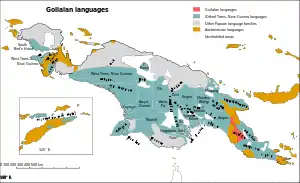Goilalan languages
The Goilalan or Wharton Range languages are a language family spoken around the Wharton Range in the "Bird's Tail" of New Guinea. They were classified as a branch of the Trans–New Guinea languages by Stephen Wurm (1975), but only tentatively retained there in the classification of Malcolm Ross (2005) and removed entirely by Timothy Usher (2020).[2]
| Goilalan | |
|---|---|
| Wharton Range | |
| Geographic distribution | Wharton Range, Central Province, Papua New Guinea |
| Linguistic classification | Binanderean–Goilalan[1]
|
| Glottolog | goil1242 |
 Map: The Goilalan languages of New Guinea
The Goilalan languages
Trans–New Guinea languages
Other Papuan languages
Austronesian languages
Uninhabited | |
Languages
The languages are,[2]
The languages are clearly related, especially northern Biagai, Kunimaipa, and Weri, which might be considered divergent dialects.
Pronouns
Pronouns are:
Tauade also has the possessive pronouns ne-ve, ni-e.
Vocabulary comparison
The following basic vocabulary words are from SIL field notes (1973, 1975, 1980), as cited in the Trans-New Guinea database:[3]
gloss Fuyug Tauade head hul ha; ondobe kɔrɔtɔ hair are; hul haluma awutu ear gadolo kepapaí eye hul li; im tavai nose hul hunga; unge kiːtʰ tooth hul usi nɔtɔvai tongue hul asese aivi leg soga lɔ'vai louse hi dautʰ dog ho; oi kɔveřa pig ovo pɔřu bird Nemba; nembe kide egg hulombo mutuwu blood tana il'iví bone hude keniví skin hul hoda; ode kɔtipai breast hul duda data tree i'i eata man A'a; an baře woman Amu; amuri iva sun evuli vatava moon hama ɔne water ʒu ipi fire oki e'na·m stone zo evi'ti road, path enamba; inambe bɔřiƀařa name ifa ape'te eat huni nene ɔmei nai one fida kɔne two ʒuvalo kupal'iai
Evolution
Fuyuge reflexes of purported proto-Trans-New Guinea (pTNG) etyma are:[4]
- baba ‘father’ < *mbapa
- sabe ‘saliva’ < *si(mb,p)at
- magata ‘mouth, jaw’ < *maŋgat[a]
- mele-pila ‘tongue’ < *mele-mbilaŋ
- imu ‘eye’ < *(ŋg,k)amu
- ije ‘tree’ < *inda
References
- New Guinea World, Oro – Wharton Range
- NewGuineaWorld - Wharton Range
- Greenhill, Simon (2016). "TransNewGuinea.org - database of the languages of New Guinea". Retrieved 2020-11-05.
- Pawley, Andrew; Hammarström, Harald (2018). "The Trans New Guinea family". In Palmer, Bill (ed.). The Languages and Linguistics of the New Guinea Area: A Comprehensive Guide. The World of Linguistics. 4. Berlin: De Gruyter Mouton. pp. 21–196. ISBN 978-3-11-028642-7.
- Ross, Malcolm (2005). "Pronouns as a preliminary diagnostic for grouping Papuan languages". In Andrew Pawley; Robert Attenborough; Robin Hide; Jack Golson (eds.). Papuan pasts: cultural, linguistic and biological histories of Papuan-speaking peoples. Canberra: Pacific Linguistics. pp. 15–66. ISBN 0858835622. OCLC 67292782.